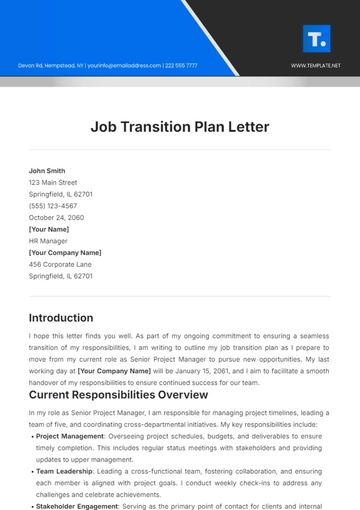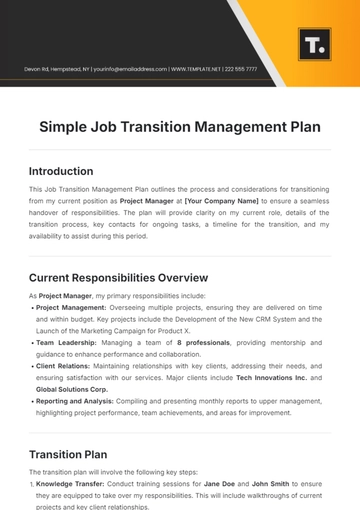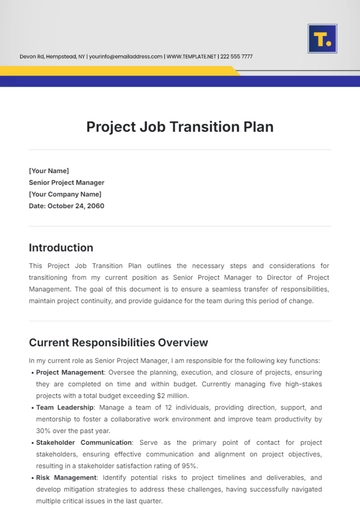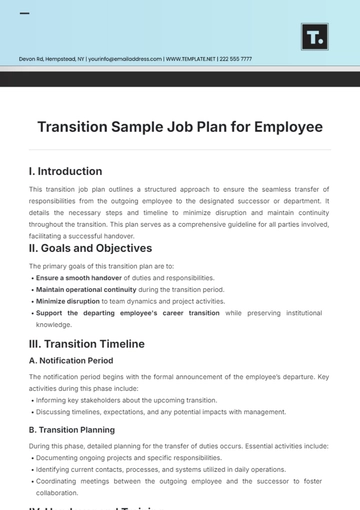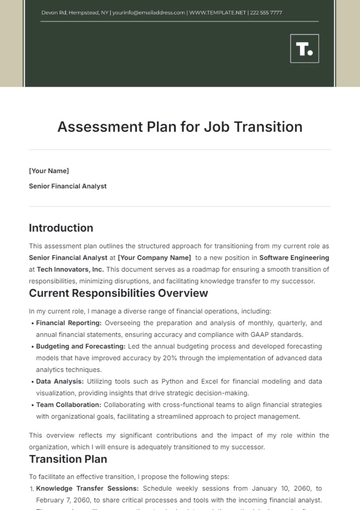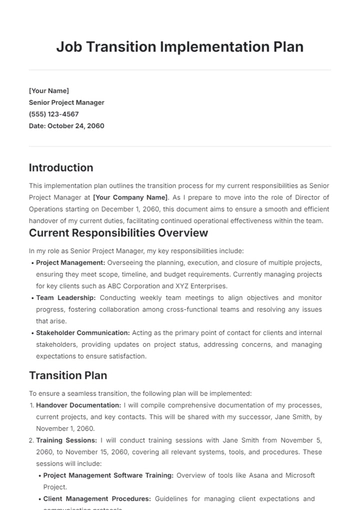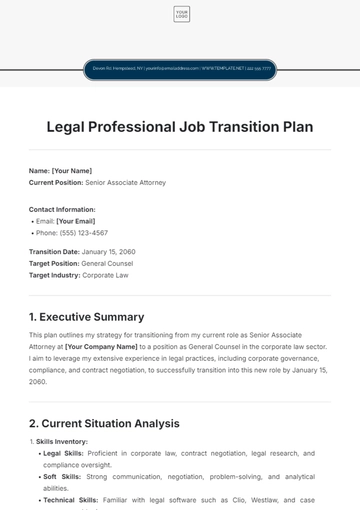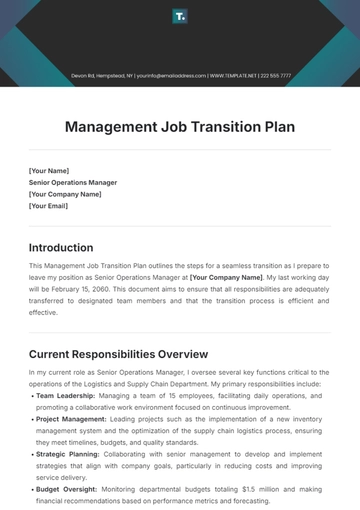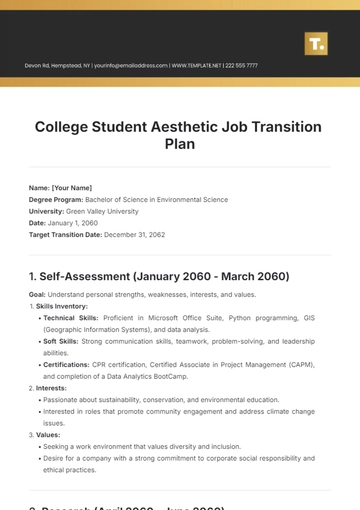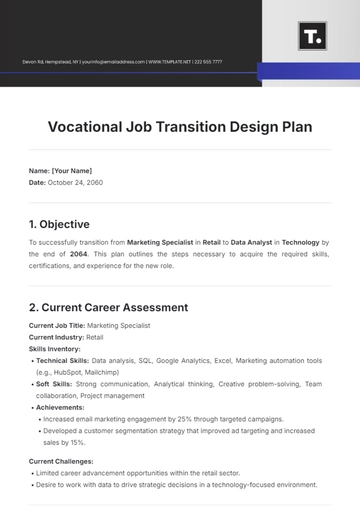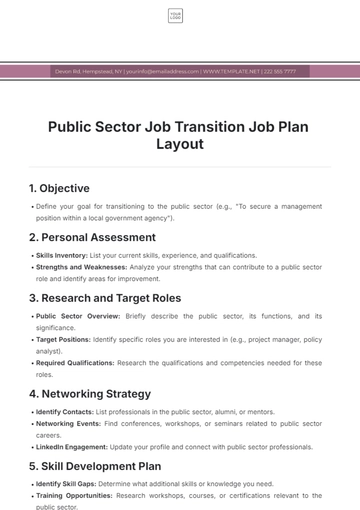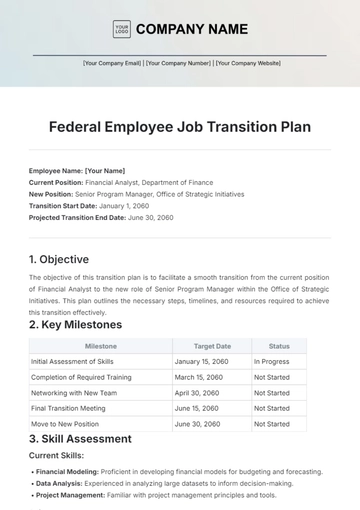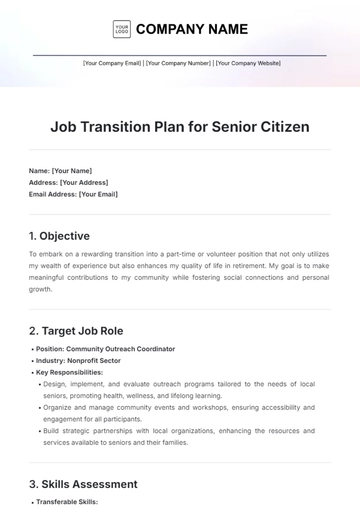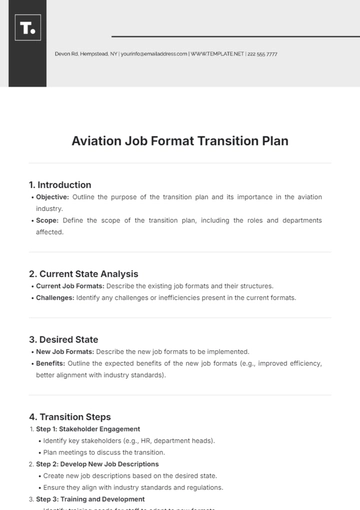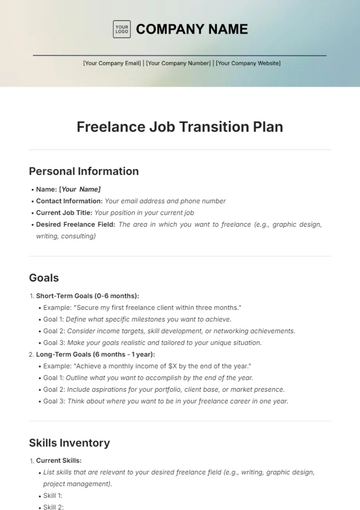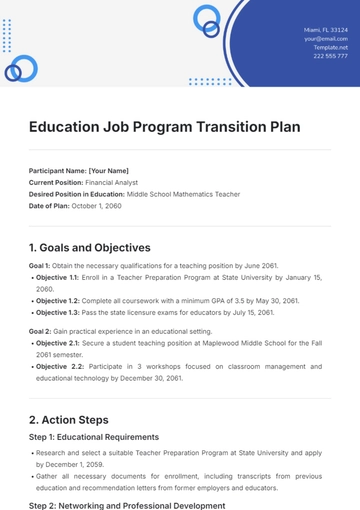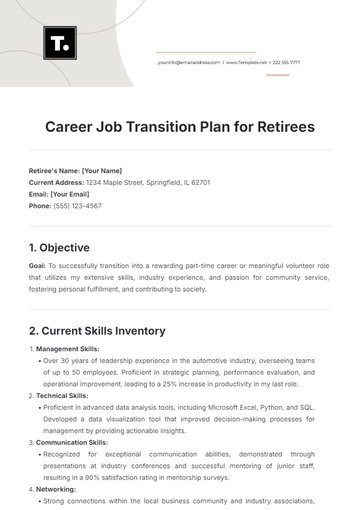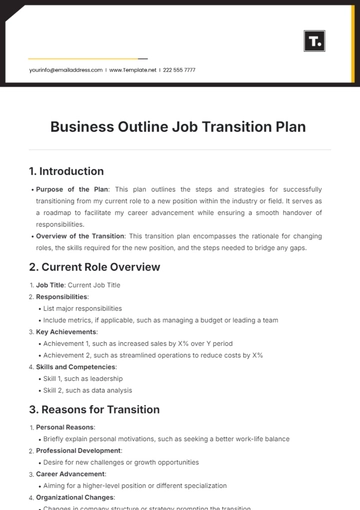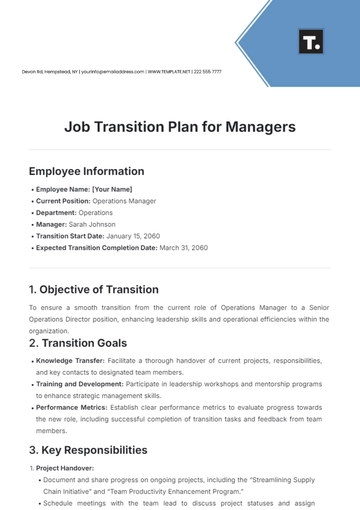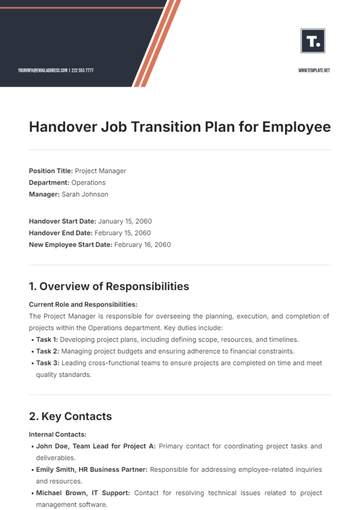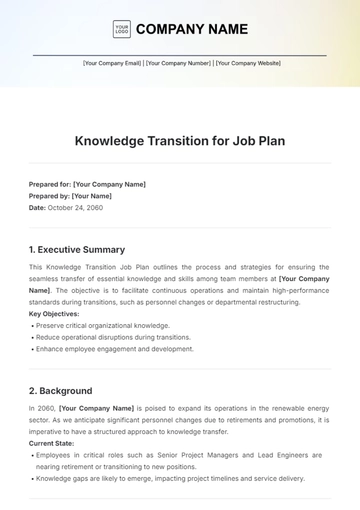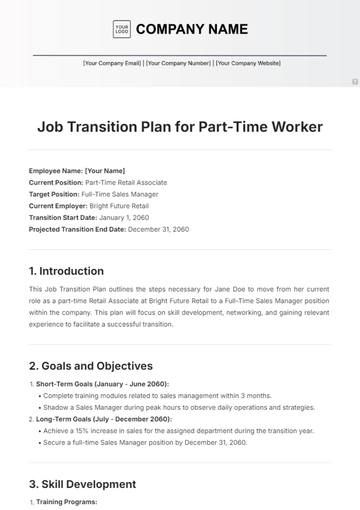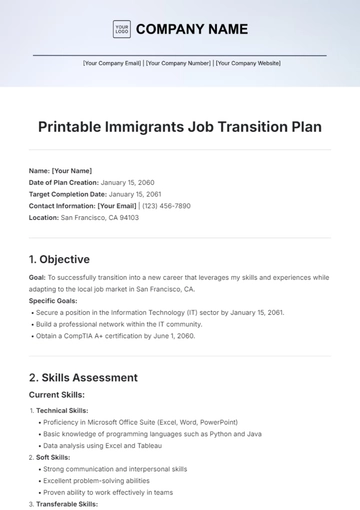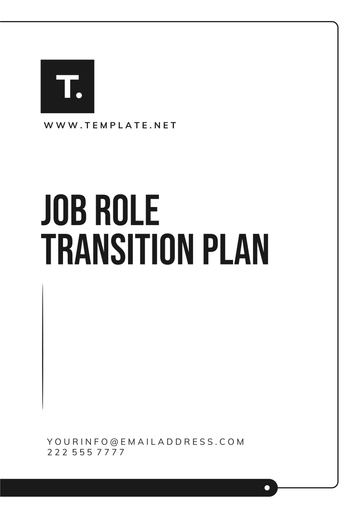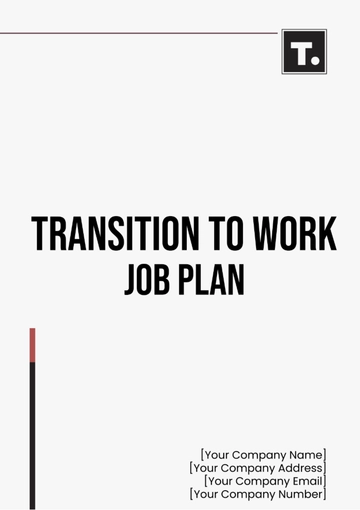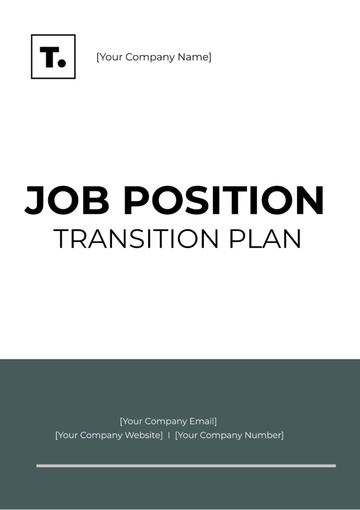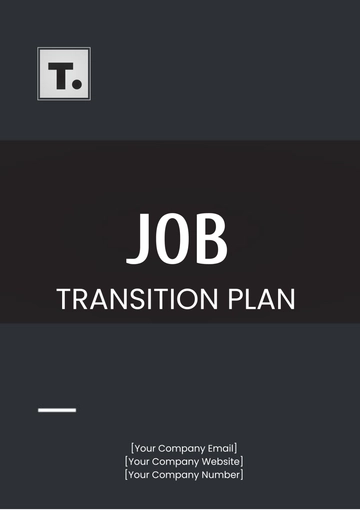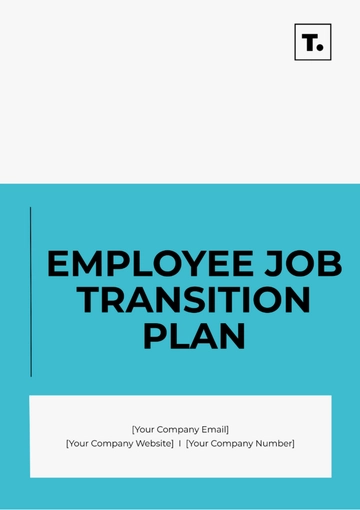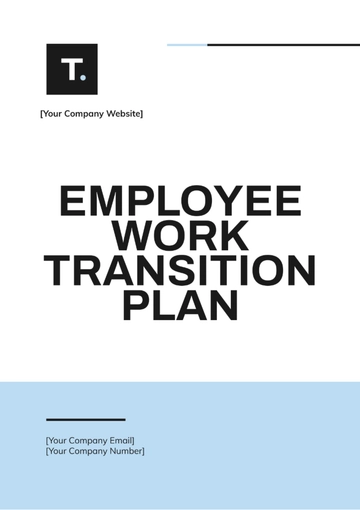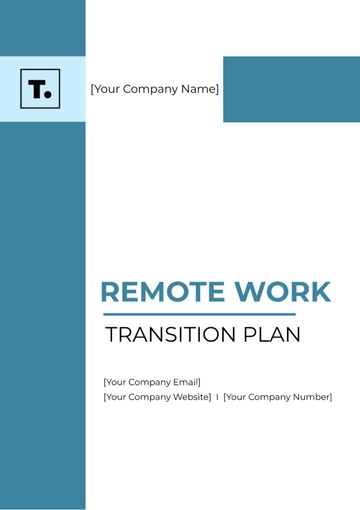Free College Student Aesthetic Job Transition Plan
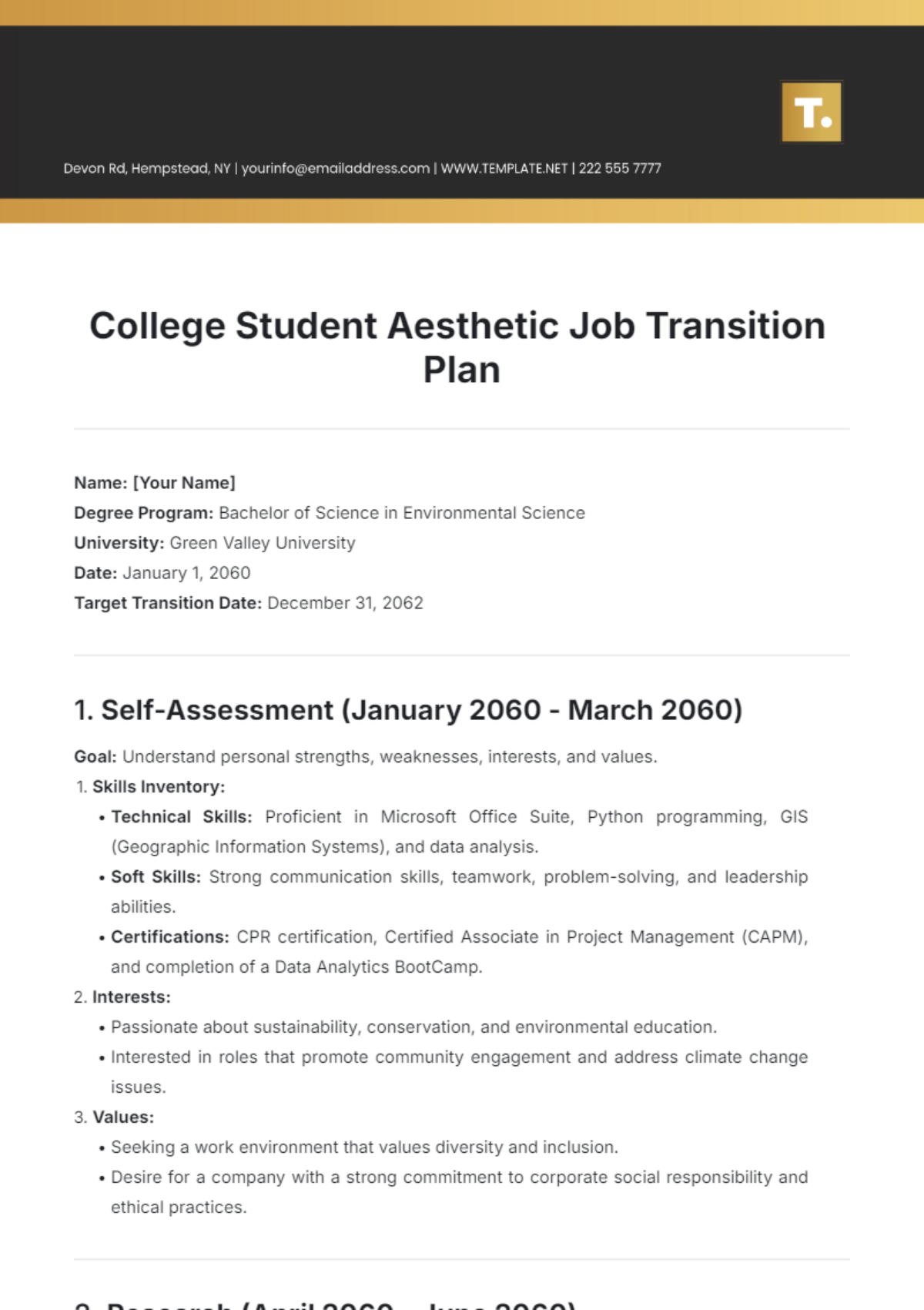
Name: [Your Name]
Degree Program: Bachelor of Science in Environmental Science
University: Green Valley University
Date: January 1, 2060
Target Transition Date: December 31, 2062
1. Self-Assessment (January 2060 - March 2060)
Goal: Understand personal strengths, weaknesses, interests, and values.
Skills Inventory:
Technical Skills: Proficient in Microsoft Office Suite, Python programming, GIS (Geographic Information Systems), and data analysis.
Soft Skills: Strong communication skills, teamwork, problem-solving, and leadership abilities.
Certifications: CPR certification, Certified Associate in Project Management (CAPM), and completion of a Data Analytics BootCamp.
Interests:
Passionate about sustainability, conservation, and environmental education.
Interested in roles that promote community engagement and address climate change issues.
Values:
Seeking a work environment that values diversity and inclusion.
Desire for a company with a strong commitment to corporate social responsibility and ethical practices.
2. Research (April 2060 - June 2060)
Goal: Identify potential career paths and companies.
Industry Exploration:
Target Industries: Non-profit organizations focused on environmental advocacy, environmental consultancy, public policy, and corporate sustainability.
Research Methods: Attend career fairs, network with alumni, and utilize LinkedIn for informational interviews with professionals in the field.
Company Analysis:
Top Companies of Interest:
Eco Solutions Inc. – Focus on renewable energy projects and sustainability consulting.
Green World Non-Profit – Engaged in community outreach and environmental education programs.
Sustainable Futures LLC – Specializes in corporate sustainability practices and consulting for businesses.
3. Skill Development (July 2060 - September 2061)
Goal: Enhance skills relevant to the targeted job market.
Courses and Workshops:
Online Courses: Enroll in courses such as "Project Management for Sustainability" on Coursera and "Advanced Data Analytics" on edX.
Workshops: Participate in resume-building and interview preparation workshops offered by the university's career center.
Internships/Volunteer Opportunities:
Internship: Secure a summer internship with Eco Solutions Inc. to gain hands-on experience in project management and sustainability initiatives.
Volunteer Work: Volunteer with Green World Non-Profit to strengthen community engagement and outreach skills.
4. Networking (October 2061 - December 2061)
Goal: Build a professional network in the chosen industry.
Networking Events:
Attend industry conferences such as the Sustainability Summit 2061 and Environmental Leadership Conference.
Join professional organizations like the Society for Sustainability Professionals and participate in local chapter events.
LinkedIn Strategy:
Update LinkedIn profile with relevant skills and experiences, including internship details and volunteer work.
Connect with professionals in the environmental field and engage with their posts to build rapport.
5. Job Search Strategy (January 2062 - June 2062)
Goal: Actively seek job opportunities and apply.
Resume and Cover Letter:
Develop a tailored resume highlighting internship and volunteer experiences, emphasizing relevant skills and coursework.
Create compelling cover letters for each application, focusing on a passion for sustainability and specific contributions to past projects.
Job Application:
Target 10-15 job applications per month, focusing on positions such as Environmental Consultant, Project Coordinator, and Community Outreach Manager.
Utilize job boards such as Indeed, Glassdoor, and specialized sites like.
6. Interview Preparation (July 2062 - August 2062)
Goal: Prepare for interviews to increase chances of success.
Mock Interviews:
Schedule mock interviews with the university's career services to practice answering behavioral questions and receive constructive feedback.
Research Companies:
Thoroughly research each company before interviews, understanding their mission, values, recent initiatives, and challenges in the industry.
7. Evaluation and Adjustment (September 2062 - December 2062)
Goal: Assess the effectiveness of the transition plan and make necessary adjustments.
Reflect on Job Search:
Evaluate the job applications submitted, interview outcomes, and feedback received.
Adjust the job search strategy based on the effectiveness of outreach efforts and any new opportunities identified.
Plan for Continued Development:
Identify any additional skills needed for desired roles and create a plan for ongoing learning, such as pursuing further certifications in environmental policy or GIS technologies.
Conclusion
This job transition plan serves as a roadmap to successfully move from college into the professional workforce. Regularly review and update each section to reflect progress and changing goals.
Signature:
 [Your Name]
[Your Name]
- 100% Customizable, free editor
- Access 1 Million+ Templates, photo’s & graphics
- Download or share as a template
- Click and replace photos, graphics, text, backgrounds
- Resize, crop, AI write & more
- Access advanced editor
College students can plan their job transitions stylishly with this editable and customizable College Student Aesthetic Job Transition Plan Template from Template.net. Easily personalized in our Ai Editor Tool to reflect your unique style and career goals.
You may also like
- Finance Plan
- Construction Plan
- Sales Plan
- Development Plan
- Career Plan
- Budget Plan
- HR Plan
- Education Plan
- Transition Plan
- Work Plan
- Training Plan
- Communication Plan
- Operation Plan
- Health And Safety Plan
- Strategy Plan
- Professional Development Plan
- Advertising Plan
- Risk Management Plan
- Restaurant Plan
- School Plan
- Nursing Home Patient Care Plan
- Nursing Care Plan
- Plan Event
- Startup Plan
- Social Media Plan
- Staffing Plan
- Annual Plan
- Content Plan
- Payment Plan
- Implementation Plan
- Hotel Plan
- Workout Plan
- Accounting Plan
- Campaign Plan
- Essay Plan
- 30 60 90 Day Plan
- Research Plan
- Recruitment Plan
- 90 Day Plan
- Quarterly Plan
- Emergency Plan
- 5 Year Plan
- Gym Plan
- Personal Plan
- IT and Software Plan
- Treatment Plan
- Real Estate Plan
- Law Firm Plan
- Healthcare Plan
- Improvement Plan
- Media Plan
- 5 Year Business Plan
- Learning Plan
- Marketing Campaign Plan
- Travel Agency Plan
- Cleaning Services Plan
- Interior Design Plan
- Performance Plan
- PR Plan
- Birth Plan
- Life Plan
- SEO Plan
- Disaster Recovery Plan
- Continuity Plan
- Launch Plan
- Legal Plan
- Behavior Plan
- Performance Improvement Plan
- Salon Plan
- Security Plan
- Security Management Plan
- Employee Development Plan
- Quality Plan
- Service Improvement Plan
- Growth Plan
- Incident Response Plan
- Basketball Plan
- Emergency Action Plan
- Product Launch Plan
- Spa Plan
- Employee Training Plan
- Data Analysis Plan
- Employee Action Plan
- Territory Plan
- Audit Plan
- Classroom Plan
- Activity Plan
- Parenting Plan
- Care Plan
- Project Execution Plan
- Exercise Plan
- Internship Plan
- Software Development Plan
- Continuous Improvement Plan
- Leave Plan
- 90 Day Sales Plan
- Advertising Agency Plan
- Employee Transition Plan
- Smart Action Plan
- Workplace Safety Plan
- Behavior Change Plan
- Contingency Plan
- Continuity of Operations Plan
- Health Plan
- Quality Control Plan
- Self Plan
- Sports Development Plan
- Change Management Plan
- Ecommerce Plan
- Personal Financial Plan
- Process Improvement Plan
- 30-60-90 Day Sales Plan
- Crisis Management Plan
- Engagement Plan
- Execution Plan
- Pandemic Plan
- Quality Assurance Plan
- Service Continuity Plan
- Agile Project Plan
- Fundraising Plan
- Job Transition Plan
- Asset Maintenance Plan
- Maintenance Plan
- Software Test Plan
- Staff Training and Development Plan
- 3 Year Plan
- Brand Activation Plan
- Release Plan
- Resource Plan
- Risk Mitigation Plan
- Teacher Plan
- 30 60 90 Day Plan for New Manager
- Food Safety Plan
- Food Truck Plan
- Hiring Plan
- Quality Management Plan
- Wellness Plan
- Behavior Intervention Plan
- Bonus Plan
- Investment Plan
- Maternity Leave Plan
- Pandemic Response Plan
- Succession Planning
- Coaching Plan
- Configuration Management Plan
- Remote Work Plan
- Self Care Plan
- Teaching Plan
- 100-Day Plan
- HACCP Plan
- Student Plan
- Sustainability Plan
- 30 60 90 Day Plan for Interview
- Access Plan
- Site Specific Safety Plan
